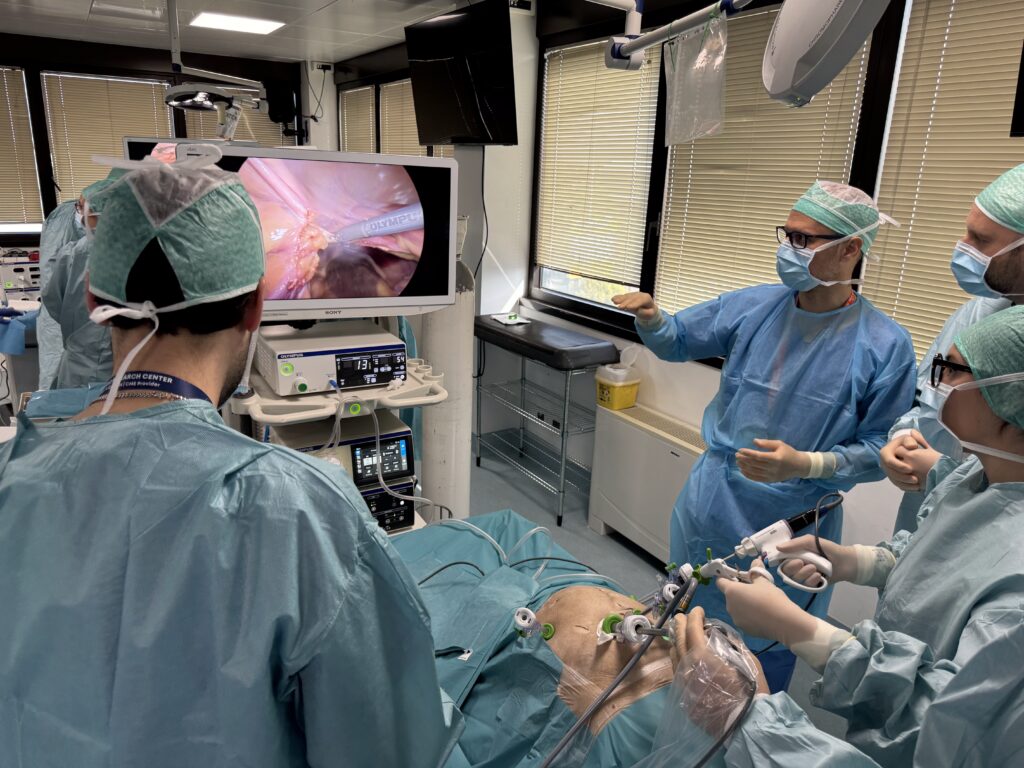
Colorectal Cancer
The ESSO Training Pathway in Colorectal Cancer Surgery provides a structured programme combining hands-on training in essential and advanced colorectal cancer procedures including minimally invasive techniques.
What's included
In addition to the mandatory and optional courses, the pathway includes a short observership and culminates with the awarding of an ESSO Certificate of Competence. Participants may also choose to take the related EBSQ examination in Surgical Oncology, however, this exam is not part of the pathway itself and is entirely optional for those who wish to furher validate their knowledge.
Related courses
Basics of Oncology for Surgeons
Level 1
Mandatory
Annual
In person
This interactive in-person programme equips young surgeons with core knowledge and skills in surgical oncology. Organised once per year, this course provides a solid foundation in cancer biology, prevention, surgical techniques, and the role of the surgical oncologist within a multidisciplinary team. Through plenary lectures and discussion sessions, participants will explore cancer progression, early diagnosis, multimodal treatment strategies, and ethical, patient-centred care. The course also emphasises cancer screening and prevention, with reference to the Europe's Beating Cancer Plan.
Essential Skills in Colorectal Cancer Surgery (Hands-on)
Level 1
Optional
Annual
In person
Description of this course still to be developed.
Colorectal Cancer Surgery (Hands-on)
Level 1
Mandatory
Biennial
In person
This hands-on workshop is taking place every 2 years and is designed to equip young surgeons and residents with essential anatomical knowledge and surgical skills for modern colorectal cancer treatment. Participants will engage in cadaver-based sessions, video discussions, and lectures, supported by a pre-course 3D surgical anatomy atlas provided by Incision. The course covers the anatomy of the colon and rectum, and technical aspects of surgical approaches, dissection, reconstruction, stoma creation, and pelvic floor repair, all with a strong focus on oncologic principles. Interactive discussions will address participant-selected topics and questions.
Portsmouth Colorectal Congress
Level 2
Optional
Annual
In person
The annual Portsmouth Colorectal Congress focuses on advancements and best practices in colorectal surgery, specifically robotic and minimally invasive approaches, and the principles, applications, and controversies surrounding Total Mesorectal Excision (TME) and Complete Mesocolic Excision (CME) techniques. It brings together experts to discuss and demonstrate these techniques through state-of-the-art lectures and live operating sessions, including both laparoscopic and robotic approaches.
Oncological Standards in Minimally Invasive Colorectal Surgery (Hands-on)
Level 2
Mandatory
Biennial
In person
This course is organised every 2 years with the goal of introducing minimally invasive colorectal surgery with a focus on 3D laparoscopy. Participants will explore both technical and oncological aspects of colorectal resections, including the use of Indocyanine Green (ICG) for lymphadenectomy and intraoperative angiography. Hands-on sessions on cadavers will cover 2D and 3D laparoscopic right hemicolectomy, low anterior resection, intra-abdominal anastomosis, and splenic flexure mobilization. Learning is supported by lectures, how-to videos, and interactive discussions. Topics include TME, CME, 3D laparoscopy, ICG use, AI, and green surgery principles.
Abdominal Surgery – Surgical Technique (Hands-on)
Level 1
Optional
Annual
In person
Organised each year, this hands-on workshop focuses on the surgical anatomy of abdominal organs and vessels, integrating practical dissection with interactive discussions on management challenges. Using specially embalmed bodies, participants will apply oncological surgical techniques, learning key pearls and pitfalls for each organ. The course includes video sessions, plenary lectures, and a pre-course 3D surgical anatomy atlas to enhance anatomical knowledge and surgical skills. Objectives cover cardiovascular access to abdominal organs and advanced oncologic surgical techniques.
Artificial Intelligence in Healthcare
Level 1
Optional
Annual
In person
Artificial Intelligence (AI) is transforming healthcare, offering tools that enhance both clinical efficiency and patient care. In this hands-on workshop which is organised once per year, interested surgeons and radiologists will explore how AI works, learn to train models for real-world applications, and apply their medical expertise to develop practical solutions using clinical data, images, and reports.
This workshop offers a hands-on introduction to AI in medicine, covering model types, tasks, real-world use cases, and the role of clinical expertise. Participants will use Python tools to work with public datasets, analyse medical images, and create 3D organ models for surgical planning. The course includes plenary lectures and practical exercises.
Fluorescence-Guided Surgery
Level 1
Optional
Biennial
In person
Organised every 2 years, this course offers essential and advanced insights into fluorescence-guided surgery. It is focusing on tumour and lymphatic imaging, sentinel lymph node detection, visualisation of vital structures (bile ducts, ureters, nerves), and tissue perfusion assessment. Participants will explore both standard and targeted imaging agents (e.g., antibody-, peptide-, nanobody-based) and gain practical experience in open, laparoscopic, and robotic settings.
Hands-on sessions using different fluorophores and imaging systems are complemented by plenary lectures on key topics, including lymphatic and tumour imaging, perfusion assessment, and intraoperative navigation of vital structures.
Related webinars
To complement your knowledge gained through the Training Pathway courses, ESSO recommends following optional webinars covering both specialty-specific and transversal topics. These webinars provide in-depth insights, may include interactive case discussions, and are designed to enhance clinical understanding and support continuous professional development.
Short-term observership
To enhance their training, participants in the Colorectal Cancer Surgery Training Pathway are invited to independently arrange a short-term observership at an ESSO-approved unit for training. Lasting 1 to 3 months, this self-organised observership can include access to operating theatres, outpatient consultations, MDT meetings, and research activities. Direct clinical involvement is not anticipated.
ESSO Certificate
The ESSO Certificate of Competence is awarded upon successful completion of the full Training Pathway, including all mandatory courses and a short-term observership. It recognises a surgeon’s advanced knowledge and skills in evidence-based surgical oncology within their chosen specialty.
EBSQ examination recommendation
Each year, the European Union of Medical Specialists (UEMS) organises the European Board of Surgery Qualification (EBSQ) Examination in Surgical Oncology. This is an optional opportunity for those who feel prepared and wish to further assess and consolidate their knowledge.